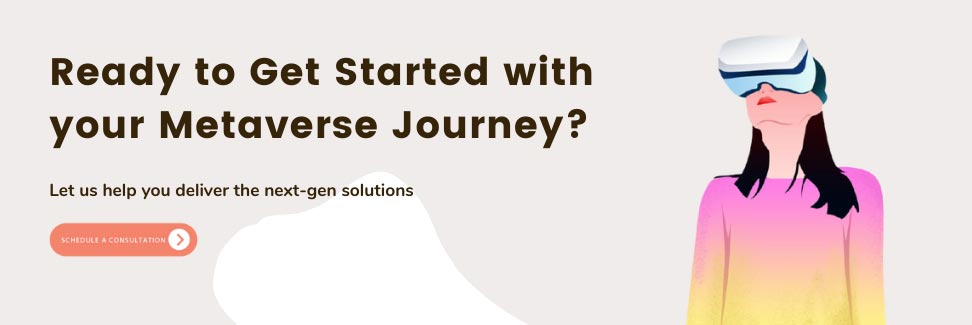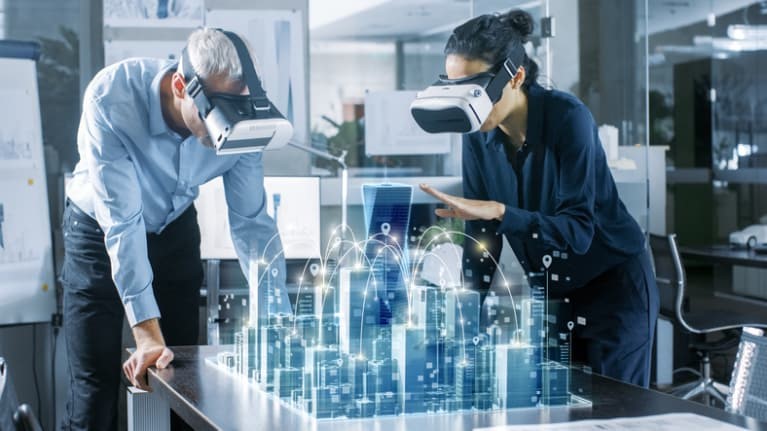Virtual Reality Concept
With the Industry 4.0 revolution and swift digitization, there is a great shift in the skill requirements of the workforce. World Economic Forum research also estimates that by 2020, which is already here, around 35% of the skills needed for different job families will change. So how do you think the game will change?
There will be a crucial need for corporate training that delivers learning exactly according to the pace of technological advancement. According to Statista, $362.2 billion on the training initiatives! It is a great loss to companies when employees do not engage and grasp learning completely from these training sessions.
Don’t you think that the traditional classroom training and seminars are less engaging or say a little boring?
We are not saying that formal corporate training has no role in employee development. It is just that training also needs to be rekindled. Virtual reality will change the face of training sessions by imparting active learning and memorization with unique practical experiences.
There are many complex definitions of virtual reality but in simple words, the definition can be extracted by combining the two words ‘virtual’ which means ‘near’, and ‘reality’ which means a truth experienced by a human being. Virtual reality is hence the imitation of reality using technology.
The technical definition of Virtual Reality
Virtual reality is a term that is used for describing 3D, computer-generated environments that can be explored and interacted by an individual. In VR, a person is immersed in a digital environment where objects can be manipulated and series of actions can be performed
For decades, trainers are facing the issue of preparing learners to face extraordinary and dangerous situations that require quick decision making and action. Exposing learners in such situations in live training can, however, be dangerous and costly. VR training breaks all the challenges that are posed in traditional training. A fully realistic 3D environment trains the workers in a way that was never imagined in previous decades. In a VR training environment, learners will be armored with the ability to face complex challenges in their jobs. So what makes VR training different?
VR training benefits
- Immersive learning
- Higher in knowledge retention
- Builds muscle memory
- Higher engagement
- Lower cost
- Several practice sessions with variations
This blog intends to help readers realize the importance of VR training system that may become a necessity in future decades.
The real-life uses cases of VR training discussed in this blog will spark your interest in the revolutionary VR training system.
IATA Virtual reality training
The International Air Transport Association is a trade association of the world’s airlines. The organization implemented a VR system into ground operations training. There were ample reasons for the organization to streamline VR in ground operation training.
Challenges faced by IATA
- The inability of trainees to actively participate in training resulting in less positive learning experiences
- Classroom-based training becomes heavily dependent on the instructor’s ability to keep students engaged.
- There is poor knowledge retention with traditional training. According to Herman Ebbinghaus’s Forgetting Curve, within 24 hours of the training, approximately 70% of memory from training is lost if no efforts are made to retain it!

- Constraints in accessing the aircraft for training and the weather conditions that may not be suitable for training every time.
- Infrequent exposure to irregularities, Fortunately, irregularities like aircraft damage and equipment malfunctions are rare and they are practically impossible to show trainees in reality
VR as a training solution
The RamVR tool used by IATA for ground operations training has successfully helped the organization in overcoming the above challenges. The tool offers a capability to instructor’s access the simulated aircraft “on-demand”. The simulated aircraft is not the ordinary simulators but are the ones with a realistic, immersive and interactive training environment that is fully compliant with global industry standards.
RamVR tool advantages:
- Theoretical training with practical experience
- Creates a multitude of scenarios and operational issues
- Allows trainees to familiarize with different aircraft types
- Simulates day and night operations with and varying levels of visibility
- Scores students and provides instant feedback
- Mirrors reality operational environment and follows IATA Standards: Airport Handling Manual (AHM) and IATA Ground Ops Manual (IGOM)
| Are you also looking for a VR based training solution? Queppelin is here to help you in making your business processes safer faster and efficient at low costs. |
Volkswagen uses Innoactive Hub for VR training
Over 10,000 employees of Volkswagen were trained with VR in collaboration with VR studio Innoactive. The employees were given training on production and logistics over 30 VR training simulations that were created in partnership with Innoactive. The workflows and knowledge transfer improved significantly with the VR headsets that were made available throughout the group.
Virtual reality technology is a great way for Manufacturing Industry to allow the employees to get training on assembly, allowing him to experiment with 3D Models. #VR allows you to train and get an assessment.
NEA calling tenders for officer’s training
The National Environment Agency (NEA) has also called the VR solutions for the training of its enforcement officers. The officers will be trained in operations like dengue inspections and enforcement of offenses including smoking and littering. The real-life situations will be simulated for training the officers. The three-pronged approach of the VR training sessions will make NIA future-ready and change responsive.

VR training
IATA, Volkswagen, NEA are not the only companies that are equipping their workforce to deal with future challenges and enhance productivity to become future-ready organizations. There are many other companies across industries that are shifting to the VR training system from the traditional training system.
Queppelin strongly believes that passive learning and memorization is the model of past and time is here for active training where employees learn through practical experience. We offer the best VR training solutions that help businesses to improve the learning process and retention rate by up to 75%.
Reach us at: enquiry@queppelintech.com to collaborate with us.






